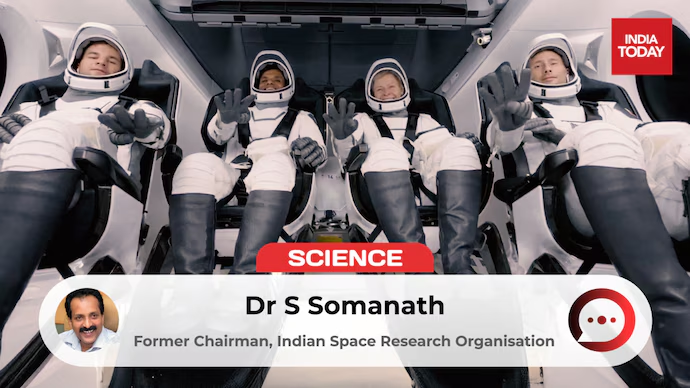Axiom-4 is the fourth private astronaut mission organised by Axiom Space in partnership with NASA and SpaceX, marking another step toward building a permanent commercial presence in low-Earth orbit.
The Ax-4 Mission gives an Indian astronaut a first-hand experience of what it takes to go into space, live in zero gravity and then return. The wholesome experience will boost India's own emerging spaceflight program - Gaganyaan.
Interestingly, astronaut Shubhanshu Shukla is also one of the four candidates selected to be part of the ambitious mission to go into space from India on Gaganyaan.
The scientific experiments that he will conduct have also been chosen carefully to enhance the preparedness for the Gaganyaan Mission. The operational experience gained — from pre-launch quarantine and international collaboration to microgravity experiments, ingress and egress procedures, medical diagnostics, health readiness protocols, and collaborative training — will be invaluable for the success of Gaganyaan.
"Launched on June 25, this moment is far more than a scientific milestone; it is a symbol of India’s ascent into the league of spacefaring nations, fuelled by decades of determination and the dreams of 1.4 billion citizens.
As India charts its course through the Gaganyaan program, prepares for its own Bharatiya Antariksh Station (BAS), and aims for a crewed lunar mission by 2040, Ax-4 marks the dawn of a new era," says Dr S Somanath, former chairman ISRO.
"Designing a human-rated spacecraft is a technically complex task, requiring a deep understanding of human-machine interfaces in extreme conditions. While published data exists, much of the nuanced knowledge - especially regarding the operational procedures and ergonomic demands of space travel, remains tacit and rarely shared beyond those with direct mission experience.
In this regard, astronauts who have been to space offer invaluable insights into capsule design, interface configuration, and mission execution," he wrote in an opinion piece for 'India Today'.
It will also play a crucial role in strengthening India’s space research ecosystem and preparing future astronauts for complex space missions.
As Shubhanshu Shukla embarks on his 14-day odyssey around Earth, it’s not just his family holding their breath, nor just the streets of Lucknow bursting with pride — it’s an entire nation watching with awe.
In that moment, as he lifts off into the stars, he carries more than a mission; he carries the hopes, dreams, and unspoken prayers of 1.4 billion Indians as he requested.
The Department of Space proposed a bold idea in 2023: sending an Indian astronaut to the International Space Station (ISS) through international collaboration.
This idea gained momentum just as discussions were underway ahead of Prime Minister Narendra Modi's visit to the United States.
The proposal argued that such a mission would give India access to state-of-the-art technologies in human spaceflight, knowledge that could significantly inform and accelerate the Gaganyaan program. At the time, India already had a unique advantage: four astronauts trained under Gaganyaan were available, and one or more could be deployed for the ISS mission.
Given that NASA no longer undertakes government-sponsored foreign astronaut missions, a commercial partnership was explored. Axiom Space, a company pioneering commercial human spaceflight using NASA’s legacy expertise, emerged as the ideal partner.
A mutually beneficial arrangement was reached, whereby a mission pilot seat originally reserved for NASA on Axiom Mission 4 (Ax-4) was allocated to India.
In 2024, a formal US-India partnership agreement was signed between the Indian Ambassador to the US and American counterparts, enabling this collaboration and facilitating the commercial engagement of ISRO with Axiom Space. Following this, a contract was finalised, setting in motion the selection process for India’s astronauts.
ends





No comments:
Post a Comment